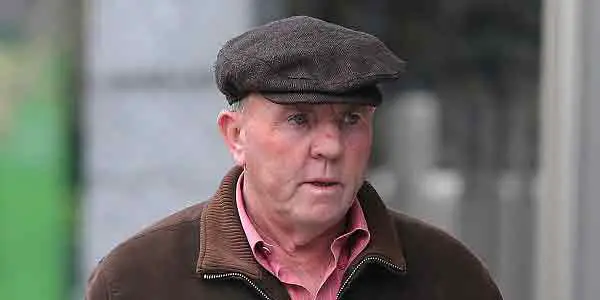Prominent Irish republican Thomas “Slab” Murphy has been found guilty of tax evasion.
The 66-year-old, from Ballybinaby, Hackballscross, Co Louth, a farm that straddles the border with Northern Ireland, denied nine charges of failing to comply with tax laws in the Irish Republic.
Following a 32-day trial at the three judge Special Criminal Court in Dublin, Murphy was convicted on all nine charges.

The prosecution alleged the farmer did not furnish authorities with a return of income, profits or gains or the sources of them over eight years from 1996 to 2004.
Judge Paul Butler, presiding in the non-jury court, remanded Murphy on continuing bail ahead of sentencing.
“The court is satisfied beyond reasonable doubt that in the case of each of the individual accounts on the indictment the accused is guilty,” he told the court.
The sentencing issue will be mentioned in court on February 12.
Dressed in a brown jacket, trousers and a pink open-neck shirt, Murphy sat alone in the public gallery for the verdict.
A number of friends and relatives sat separately a short distance away.
During his closing submission, defence senior counsel John Kearney had told the court it was Murphy’s brother Patrick who ran the operation at Ballybinaby and controlled the finances of the farm.
It was also alleged during the trial that some of the documents purported to have been signed by Murphy had been forged.
Opening the judgment, Judge Butler said the court was aware of widespread publicity around the trial and references to Murphy’s “unconnected activities”.
He said: “While the court is wholly aware of that publicity, it has no bearing whatsoever upon the Revenue charges brought against the accused in these proceedings and the court is in no way influenced by that publicity.”
Murphy left court with his solicitor without speaking less than an hour after the verdict.
The trial heard Murphy drew state grants for his border farm worth more than 100,000 euro (£73,000).
Substantial cash payments of more than 300,000 euro (£220,000) were also made by the accused to rent land over the same period, as well as payments in relation to silage used on the rented lands, it was claimed.
The case centred on farming documents signed by a “T Murphy” which included applications for a herd number, grants and cheques or payment orders payable to “T Murphy”.
There were also records of transactions at cattle marts and meat processing plants and payments from these to a bank account in Murphy’s name.
The border farmer and cattle dealer was also renting land to keep livestock, the court heard.
The judges said they considered documents, including the application for a herd number – the registration issued to farmers allowing them to access grants.
And they said Thomas Murphy’s bank account was being used by him, including 30 cheques being signed by him and payments made from it to a personal pension fund.
There was also a book detailing sales from the Murphy herds in the eight years to 2004 and diary entries made by Patrick Murphy about money Thomas Murphy was being paid.
The Criminal Assets Bureau – a special division set up after the murder of journalist Veronica Guerin in 1996 to crackdown on proceeds of crime – investigated Murphy’s tax affairs.
Judge Butler said there was no doubt Murphy was earning money from selling cattle.
The farmer’s lawyers claimed the operation was being run by his brother Patrick and a number of herds were being kept together on the border lands.
They also alleged “forgery was afoot” in the some of the farm documents which referred to Patrick Murphy but were signed by Thomas.
The trial also heard his brother Patrick had settled tax bills worth more than one million euro (£730,000) with the Revenue.
Murphy was charged with five counts under the Irish Republic’s Taxes Consolidation Act and four under the Finance Act that he knowingly and wilfully failed to make tax returns and did so without reasonable excuses.
In the trial, vet Patrick Flanagan told the court Thomas Murphy was a beef and suckler cow farmer for years and had signed Department of Agriculture forms in his presence.
Land owner Brian Garvey said he discussed farming issues with Mr Murphy the day before he made a statement in 2005.
Ahead of the sentencing, the judges asked for the prosecution lawyers to provide information on sanctions for similar convictions.
They also asked them to show how those cases relate to the Murphy tax evasion and to provide an estimated loss to the Exchequer.
Murphy’s previous convictions, if any, will also be detailed to the court, the judges said.